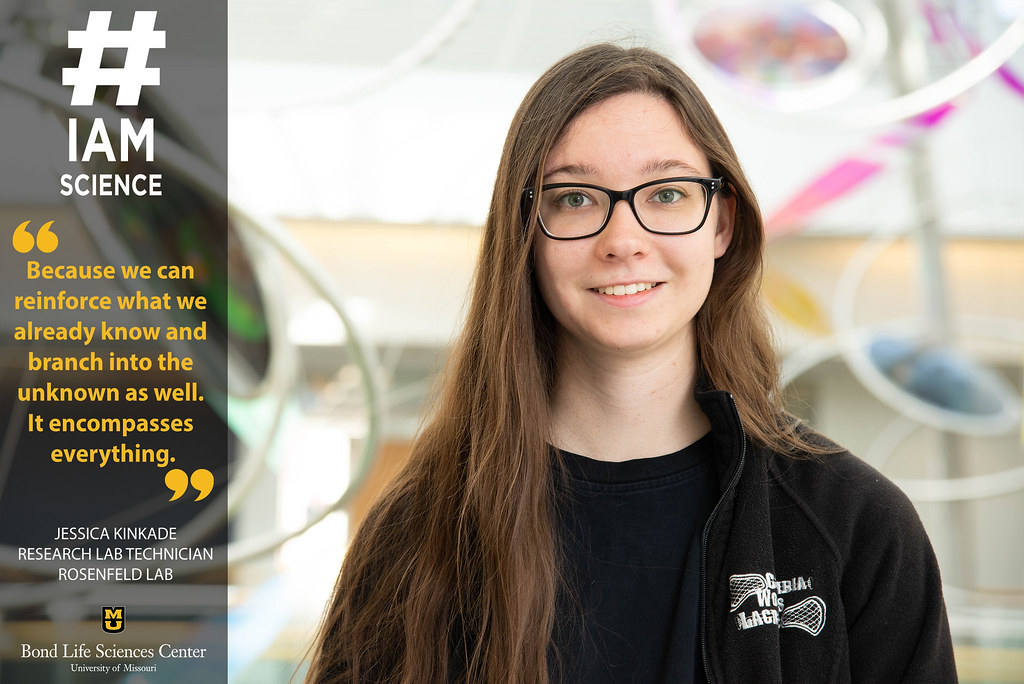By Becca Wolf | Bond LSC
Growing up in Columbia, Jessica Kinkade never thought she would end up working in town.
“I never expected to come back here, but it’s neat that it worked out that way,” Kinkade said. “It’s nice to be able to see my family and work in a familiar place that I’ve lived my whole life.”
Kinkade went to college about 30 minutes east of MU at Westminster College in Fulton, MO.
“I always had an interest in science, especially natural and biological sciences, ever since I was little,” Kinkade said. “I was always interested in a lot of different aspects of it, and my interests turned into something more so that developed, along with me.”
Now a research lab technician in the Rosenfeld lab at Bond Life Sciences Center, she is happy to be back.
“Mizzou is a really good school for science. There are a lot of job opportunities here because it’s such a big school and they do a lot of interesting research so it’s a good resource for that,” Kinkade said. “Just a good place to find work overall.”
As a research lab technician, Kinkade has several responsibilities. She often helps on research as well as taking care of the animals, coding and collecting data, keeping track of supplies as well as other support work.
A self-proclaimed animal lover, Kinkade especially likes working with the animals. Currently, the lab has California Mice, which is a species of deer mouse.
The dark brown mice with big eyes can be quite a handful.
“They’re really fun to work with, but they’re kind of crazy, because they’re wild and not quite as tame,” Kinkade said.
This can make work quite interesting.
“They jump when they get excited so it’s easy for them to jump out of their cages, we have to chase them around a lot,” Kinkade said. “We’ve had to chase them across the floor and grab them quickly before they can run and hide anywhere.”
For the past two years, Kinkade has been focused on studying the behavioral affects BPA (bisphenol A) and genistein has on the behavior of California mice. Xenoestrogens, BPA and genistein, can be found in plastic and in things such as coffee and soybeans. These are known as “forever chemicals” because they do not easily breakdown in the environment. Knowing the behavioral effects of these xenoestrogens can help researchers better understand how the chemicals may be affecting humans as well.
The past few months Kinkade has been wrapping up this research, “It’s exciting to see the studies all come to a close and get the results,” she said.
Kinkade does not plan on ending her animal research there though.
“Right now, we’re trying to breed a strain of serotonin knockout mice,” Kinkade said. “We’re trying to get a colony started so we can begin a study with them. They’re difficult to breed so we’re still working on that, but hopefully we will get a project started soon.”
Kinkade points to her college years for her passion of animals.
“Back in college I got to work on my own independent research project, which was mapping the territories of Cardinals,” Kinkade said. “It was a lot of being outside, looking around and listening, which I thought was really fun.”
Being excited about your work is important, and Kinkade certainly is. Projects like her independent research project kept her inspired and excited about being in a science field. She carries that energy with her to Bond LSC.
“There’s always a lot to do and maintain here. Sometimes it is a lot of work and routine, but then you remember why you’re doing it and what you’re learning,” Kinkade said. “I remember that excitement I would feel throughout school, and remember that’s what I’m doing right now, which feels good.”


